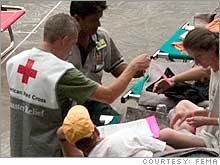A charity of one's ownYou don't have to be filthy rich to give as if you were. Donor-advised funds are becoming the vehicle of choice for mainstream investors.(Fortune Magazine) -- So you're not Warren Buffett or Bill Gates. There's no reason you still can't give like a billionaire. Donor-advised funds - investment accounts that let you deposit assets for an upfront tax deduction, then make donations to charities of your choice - have become a popular option for investors. "These funds are offering people an easy way to give that they never thought was available to them," says Stacy Palmer, editor of The Chronicle of Philanthropy.
Donor-advised funds are a foundation-in-a-box. They start out like a typical investment account - you deposit cash, securities, or, in some cases, real estate in a fund that invests in stocks and bonds. (The typical minimum is $10,000.) Then you take an immediate tax deduction and make grants to your favorite charities whenever you wish. The rest of your kitty continues to grow (or shrink). And you get to name your account something wonderful: Your Name Here Fund for World Peace. (The typical grant minimum is $250.) Growth in donor-advised funds has been impressive; new accounts hit a record high last year. All told, the funds distributed $3.3 billion to charity last year, and assets in donor-advised funds currently top $17 billion, up 15.5 percent from last year, according to the National Philanthropic Trust. The booming stock market has been the driving force. "There's a direct correlation," says David Giunta, president of the Fidelity Charitable Gift Fund, citing appreciated stock as the most popular way to open an account. Many donor-advised funds are sponsored by familiar names - Fidelity, Vanguard and Schwab (Charts). And competition is getting fierce: Fidelity recently lowered its fees across the board, from 1 percent to 0.6 percent of total assets for most accounts, and halved its account minimum to $5,000. Donor-advised funds are also offered through universities, community trusts and relief organizations, though you may pay more in fees. The collective power is undeniable. "We saw a huge spike in donations from donor-advised funds after Hurricane Katrina," notes Robert Schmidt, director of planned giving for Habitat for Humanity. "For years I thought that they were just a lot of sex appeal but not a lot of substance." Now the organization has become increasingly reliant on the donations. "I've certainly been proved wrong," says Schmidt. ________________________ |
|

